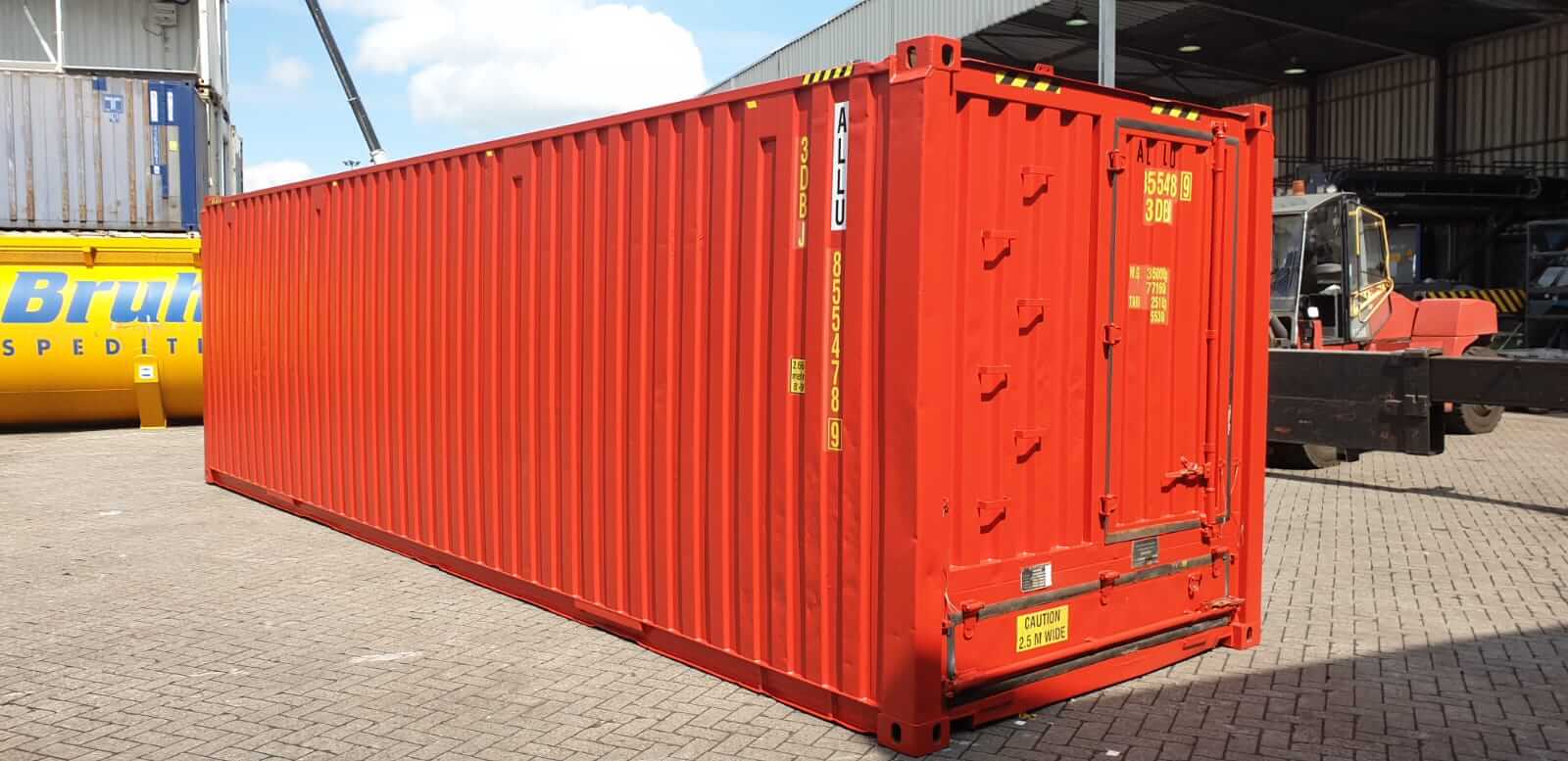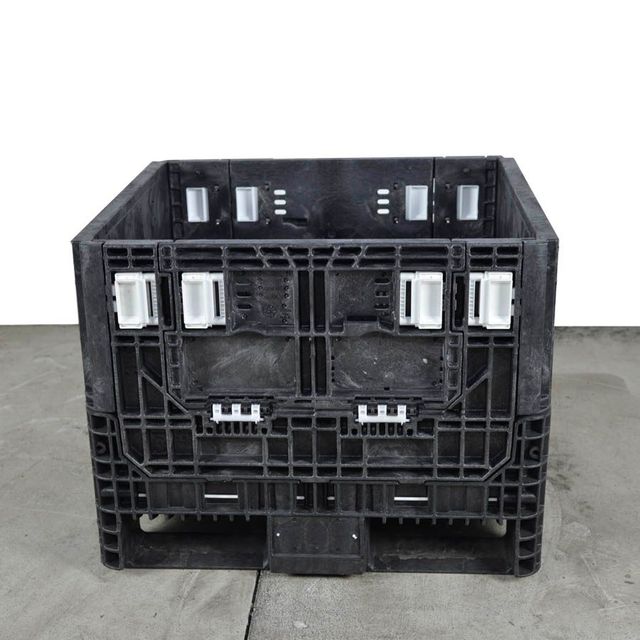Why Bulk Containers Are Necessary for Cost-Effective and sustainable Transport
Bulk containers play an important role in modern logistics. They assist in the efficient activity of huge amounts of items, consequently optimizing transportation processes. This method not just minimizes expenses yet additionally decreases environmental influence with lower exhausts and waste generation. As markets look for even more sustainable methods, the adoption of bulk containers is becoming significantly substantial. What implications does this shift hold for future logistics and supply chain administration?

The Advantages of Using Bulk Containers in Logistics
Mass containers change logistics by improving performance and sustainability. These containers enable the transport of big quantities of goods in a single trip, markedly decreasing the variety of trips needed. This not just improves procedures yet additionally minimizes labor costs connected with handling, packing, and dumping. Furthermore, bulk containers are made to enhance area application within transport automobiles, making certain that even more items can be delivered at the same time.
The standardization of mass containers also simplifies the logistics process. With uniform measurements, they can be quickly piled and stored, bring about enhanced storage facility administration. Mass containers commonly feature resilient products that protect contents from damage during transit, thereby decreasing product loss and increasing general integrity. Therefore, businesses can experience improved supply chain performance, ultimately resulting in enhanced earnings and client satisfaction. This combination of aspects makes bulk containers a vital possession in modern-day logistics.
Ecological Impact: Reducing Waste and Carbon Impact
As industries progressively prioritize sustainability, the adoption of bulk containers has actually become a key strategy for decreasing waste and lowering carbon footprints. These containers lessen making use of product packaging products, such as boxes and plastic, therefore significantly decreasing general waste generation. By settling deliveries, bulk containers enhance transport effectiveness, permitting more products to be carried per journey. This reduction in journeys straight correlates with reduced greenhouse gas emissions, adding to a smaller carbon footprint.
Moreover, mass containers can typically be reused or reused, further mitigating environmental effect. The durability of these containers assurances they can stand up to numerous transport cycles, decreasing the need for single-use alternatives. used plastic containers. By streamlining logistics and advertising effective resource use, mass containers not just sustain sustainable practices but likewise encourage sectors to line up with worldwide ecological goals. Eventually, their execution reflects a commitment to environmental stewardship and accountable resource management
Price Financial Savings: Just How Mass Containers Lower Transportation Costs
While lots of business seek means to boost their bottom line, the use of mass containers offers a substantial chance for reducing transportation expenditures. Bulk containers make the most of the volume of goods transferred, enabling organizations to deliver larger amounts at the same time. This efficiency reduces the variety of trips called for, straight decreasing fuel expenses and minimizing labor expenditures connected with loading and unloading.
In addition, mass containers frequently include streamlined designs that maximize area application within transport vehicles. This indicates less vacant areas, resulting in extra efficient use of offered ability. Furthermore, the longevity of mass containers can reduce the danger of product damage throughout transportation, making sure and reducing losses that even more goods get here intact.
Enhancing Supply Chain Efficiency With Bulk Storage Space Solutions
Bulk storage options play a necessary duty in enhancing supply chain effectiveness by optimizing supply management. By combining products right into less, bigger containers, companies can substantially reduce managing prices associated with regular transfers and handling. This structured strategy permits better monitoring and monitoring of supply, eventually bring about improved operational performance.
Structured Supply Monitoring
Effective supply monitoring is vital for optimizing supply chain procedures, specifically when companies take on bulk storage options. These remedies make it possible for companies to maintain higher stock degrees while reducing the frequency of replenishment. By combining materials right into mass containers, companies can streamline their stock processes, lowering the intricacy linked with tracking multiple smaller sized bundles. This strategy helps with accurate inventory matters and boosts projecting precision, allowing for even more educated decision-making. On top of that, mass storage options streamline storage facility company, making it less complicated to locate and gain access to products when needed. As an outcome, companies can achieve a more effective supply turn over price, eventually boosting overall supply chain performance and reducing the chance of stockouts or overstock situations.

Decreased Handling Prices
The execution of bulk storage remedies not only improves supply management but likewise substantially minimizes dealing with prices throughout the supply chain. By consolidating materials right into mass containers, firms reduce the demand for constant handling and transfer between different storage and transport devices. This method minimizes labor costs related to loading, dumping, and moving smaller bundles. In addition, mass storage decreases the frequency of shipments, leading to reduced transport expenses and reduced fuel usage. As an outcome, businesses can enhance their logistics operations, permitting an extra efficient allocation of resources. Ultimately, minimized taking care of prices add to boosted total supply chain efficiency, promoting an atmosphere that supports both sustainability and economic practicality.

Convenience of Bulk Containers Across Different Industries
Numerous industries have unique demands for transportation and storage, bulk containers have emerged as a flexible solution that meets a vast range of needs. These containers, ranging from big bins to specialized containers, can suit diverse materials, consisting of powders, granules, and liquids. In the farming field, bulk containers facilitate the transportation of grains and fertilizers, while the food and beverage sector uses them for components and finished items. The chemical market depends on mass containers for securely transferring hazardous products, making certain conformity with security policies. Additionally, construction companies take advantage of mass containers for delivering accumulations and other materials. Their adaptability encompasses numerous settings of transportation, consisting of trains, vehicles, and ships, boosting logistical efficiency. This convenience not only streamlines procedures across different fields yet likewise promotes sustainability by minimizing product packaging waste and enhancing room en route. Bulk containers play an essential duty in contemporary supply chain administration.
Future Trends in Mass Container Use and Sustainability
The future of bulk container use is progressively formed by ingenious products growth that improves sustainability. Furthermore, automation in logistics assures to simplify operations, decreasing waste and enhancing performance. Embracing circular economic climate techniques will certainly further change just how bulk containers are developed, used, and reused, promoting a more lasting transport landscape.
Innovative Materials Growth
As sectors progressively prioritize sustainability, innovative materials growth in bulk containers becomes a considerable aspect in enhancing eco-friendly transportation services. Manufacturers and researchers are checking out naturally degradable plastics, recycled composites, and lightweight steels to reduce environmental influence. These materials not only lessen waste but likewise boost gas effectiveness by reducing the overall weight of containers. Furthermore, innovations in wise materials, which can adapt to differing conditions, improve the sturdiness and functionality of bulk containers. The integration of these cutting-edge products straightens with round economic situation principles, promoting reuse and recycling. As the need for lasting practices grows, the development of such materials will play a crucial function fit the future of bulk container usage in logistics and transportation.
Automation in Logistics
Substantial innovations in automation are positioned to change logistics and the utilization of bulk containers, enhancing sustainability in transportation. Automated systems, including drones and autonomous automobiles, are simplifying the movement of bulk containers, lowering the dependence on conventional fuel-powered transportation. These technologies enhance directing and packing processes, lessening vacant miles and enhancing gas efficiency. Furthermore, automated supply management systems improve monitoring and surveillance of bulk containers, ensuring far better source appropriation and lowered waste. The assimilation of the Web of Points (IoT) allows real-time information analysis, enabling aggressive decision-making that lines up with sustainability objectives. As automation remains to evolve, it is anticipated to drive further advancements in mass container usage, ultimately supporting even more sustainable logistics methods and lowering the ecological effect of transportation.
Round Economic Situation Practices
Developments in automation are setting the stage for a much more incorporated technique to circular economic situation techniques in the domain name of mass container usage. As sectors increasingly welcome sustainability, mass containers are being created for long life and reusability. This change not just minimizes waste yet additionally enhances source effectiveness. Firms are taking on strategies such as closed-loop systems, where made use of containers are collected, reconditioned, and reintroduced into the supply chain. In addition, wise modern technologies track container life process, promoting far better monitoring and reducing environmental influence. The collaboration in between makers, logistics providers, and end-users is crucial in developing standards for lasting container use. used collapsible bulk containers. Future fads indicate a growing emphasis on products that are recyclable and eco-friendly, more strengthening the round economic climate's concepts wholesale transport

Often Asked Concerns
What Products Are Mass Containers Typically Made From?
Bulk containers are typically created from sturdy products such as high-density polyethylene, steel, light weight aluminum, and cardboard. These materials offer toughness, convenience, and defense, making them ideal for transporting different items in different industries effectively.
How Do I Choose the Right Size Bulk Container?
Picking the ideal dimension mass container entails evaluating the volume of products to be delivered, taking into consideration managing equipment compatibility, and assessing storage space requirements. Appropriate dimension assurances performance in transport and lessens waste throughout delivery.
Are Bulk Containers Reusable or Recyclable?
Mass containers are typically recyclable, made for numerous trips, enhancing sustainability. Numerous can additionally be recycled, relying on the materials made use of. Choosing recyclable options further lowers and supports ecological goals waste in transport practices.
What Security Regulations Relate To Bulk Container Transportation?
Security regulations for mass container transportation include conformity with the Division of Transportation standards, proper labeling of unsafe materials, architectural integrity assessments, and adherence to weight restrictions to ensure risk-free handling and avoid crashes throughout transportation.
How Can Organizations Change to Making Use Of Bulk Containers Properly?
Organizations can alter to bulk containers by assessing current logistics, training personnel on handling, purchasing appropriate devices, maximizing supply management, and teaming up with distributors to guarantee compatibility and effectiveness throughout the supply chain.
As sectors increasingly focus on sustainability, the fostering of mass containers has actually emerged as a key technique for decreasing waste and lowering carbon impacts. By combining materials into bulk containers, business can improve their stock procedures, decreasing the complexity associated with tracking numerous smaller sized packages. As markets progressively prioritize sustainability, cutting-edge products development in mass containers arises as a substantial aspect in improving environment-friendly transportation options. Automated systems, consisting of drones and autonomous cars, are simplifying the movement of bulk containers, minimizing click here the dependence on conventional fuel-powered transportation. In addition, automated stock administration systems enhance tracking and monitoring of mass containers, guaranteeing far better source allowance and minimized waste.